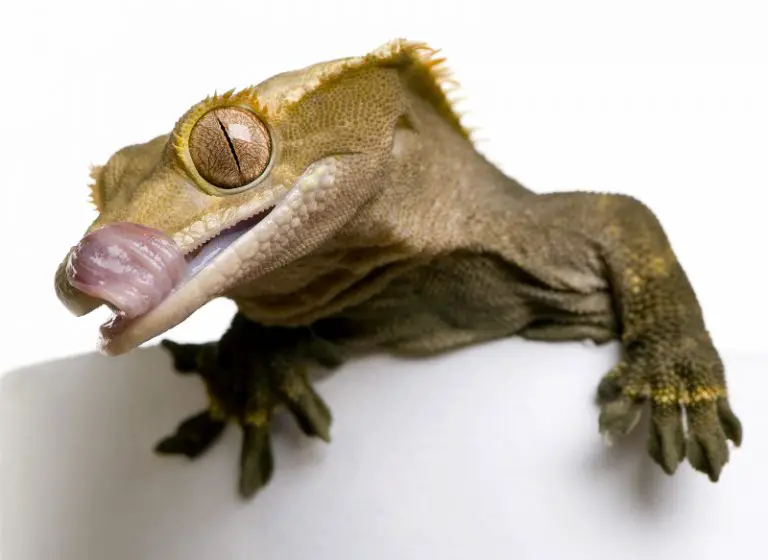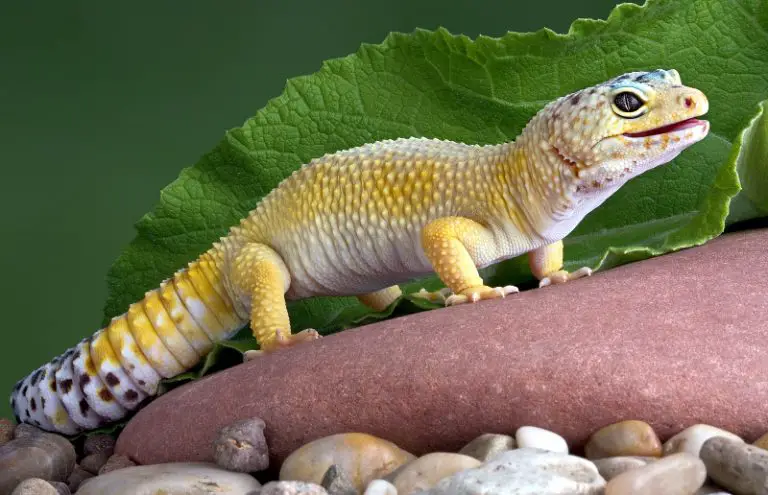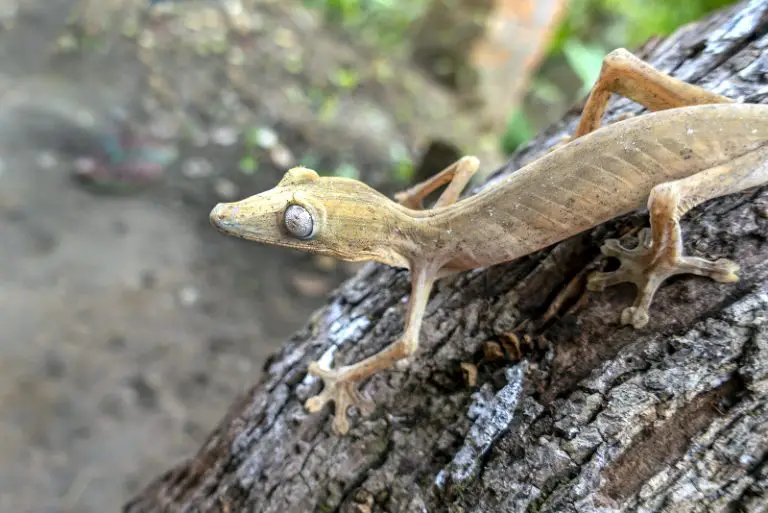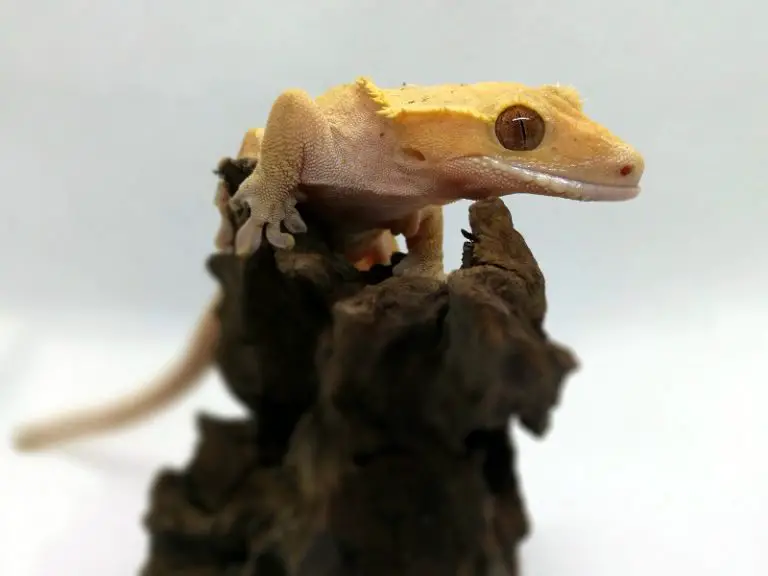Do Leopard Geckos Have Teeth? And Will They Bite You?!
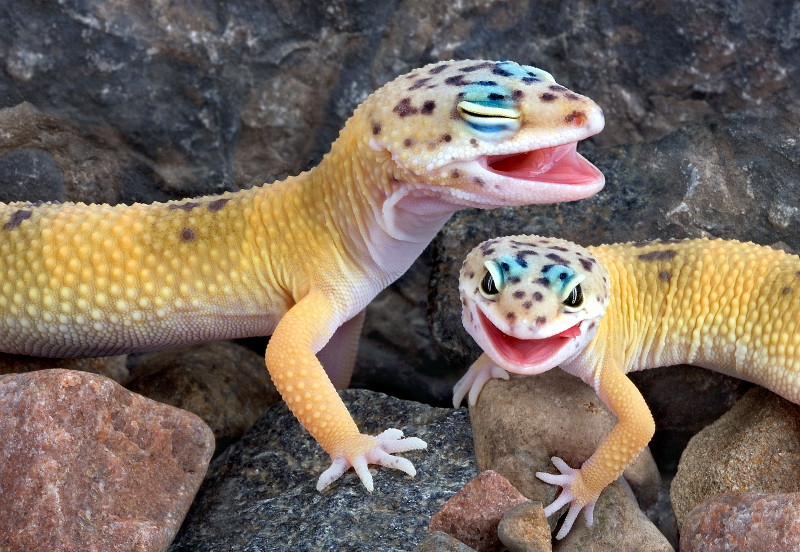
Nobody likes to get bitten by their pets. Fortunately, you don’t have to worry much with leopard geckos. They are very docile critters and won’t usually bite unless they feel threatened. They do have plenty of teeth, though, and it’s very important that you help them stay healthy.

Contents
Table of Contents
Do Leopard Geckos Have Teeth?
Leopard geckos do have teeth…100 of them! Even more impressive is that these teeth don’t need to grow in like our teeth do. Instead, leopard geckos hatch with all 100 teeth.
Leopard Gecko Teeth
What makes leopard gecko teeth different from the teeth of other lizards? Let’s find out.
What Do They Look Like?
How do leopard geckos fit all those teeth into their mouths? The teeth are arranged in multiple rows along the sides of their mouth. More teeth are found on their upper jaw than on the bottom.
As we’re sure you can imagine, the teeth of the leopard gecko are very small, about 0.5 inches in length.
Each tooth is shaped like a cone. They are very sharp and pointy. Because leopard geckos are insectivores, these teeth are designed to easily cut through the bodies of their prey.
Lizards do not chew their food, so they are not in need of the kind of teeth that shreds and slices food. Instead, they catch and crush their food so that it dies. Then, they swallow their food whole.
Can Leopard Gecko Teeth Regrow?
Leopard geckos are polyphyodonts which means that they lose and regrow their teeth. They will lose all their teeth every 3-4 months before they’re replaced by new ones.
They don’t even need to wait for their teeth to regrow after losing them. The new teeth are already developed and ready to move in as soon as the old teeth leave.
How this works is that the baby tooth will begin to grow while the gecko still has its adult teeth. The baby tooth will grow beside the adult tooth. When the adult tooth is ready to fall out, the “baby” tooth will be ready to move in.
How To Care For Leopard Gecko Teeth
The oral health of your gecko is very important. Without proper oral health, your gecko can’t eat. Unhealthy teeth can also lead to diseases and other problems.
Mouth Rot
Mouth rot is a pretty common problem in leopard geckos. It is a result of a tiny cut in the mouth that has gone untreated. Usually, your gecko will get these cuts from their food.
Mouth rot is an oral infection that results from these little cuts and can be quite painful. It affects the gums and mouth of your gecko, making it difficult to eat.
Although it’s difficult to see inside your gecko’s mouth, there are other ways you’ll know it has mouth rot.
Firstly, because of the pain, your gecko will have a decreased appetite, or may stop eating altogether.
As the infection progresses, you may begin to notice an unusual substance forming around it’s mouth. It’s head and mouth will also begin to swell.
Unfortunately, mouth rot can be fatal if it isn’t noticed and treated early. This is why it’s so important to keep an eye on your geckos mouth and monitoring how much they’re eating.
Watch this video: things you DIDN’T KNOW about LEOPARD GECKOS
How To Prevent Mouth Rot
Be Observant
The best thing you can do for your gecko is to just be observant. Keep an eye on your gecko’s mouth and what you perceive to be normal. Have you noticed any changes? It could have mouth rot.
Check Their Teeth
It can be hard to check your gecko’s teeth, but it is possible. You just need to rub something against the opening of their mouth, like a cotton swab, and that will prompt them to open up.
If that doesn’t work, you can also try lightly tapping the side of your gecko’s mouth. Just take care to be gentle and not strike too hard.
Once their mouth is open, you can monitor their teeth and gums. Although you might not be able to see any cuts, you can see whether their teeth look healthy.
Watch Them Eat
You should also keep an eye on your gecko while it’s eating. Food getting stuck inside your gecko’s mouth is the leading cause of mouth rot. If you notice your gecko struggling to swallow a piece of food, you’ll need to remove it yourself.
Proper Housing And Food
Having the proper set up with correct temperature and humidity plays a huge part in keeping your gecko healthy. You must also make sure to regularly clean your gecko’s tank. Make sure it is free from feces, dead insects, and other debris. A dirty tank or unideal conditions can quickly lead to all kinds of diseases.
You also need to make sure you’re providing them with a proper diet. Just like with humans, eating healthy foods helps to keep our teeth healthy and strong. If they’re not eating a good diet, it can cause them to have problems with their teeth.
If you need guidance on what to feed your leopard gecko, check out this article.
Can Leopard Geckos Bite?
It is very unlikely that you or anyone else will get bitten by a leopard gecko. They’re very tame animals that are easy to handle. However, there are a few reasons it may bite:
It’s Territorial
This is more of a concern for any other lizards in the tank than it is for you. You’re not likely to be bitten because you’ve entered your gecko’s tank.
However, leopard geckos are very territorial, and they don’t like others being in their space. It is not recommended to keep more than one leopard gecko in an enclosure because they’re very likely to fight. This is especially true for males.
If you want to keep multiple leopard geckos, you should house them separately. Even then, you should wash your hands after handling one gecko before handling the other. Your gecko will smell the other gecko on you and may try to bite you.
They’re Hungry
Leopard geckos become more feisty when they’re hungry. They won’t want to be handled when they’re hungry, and they’ll let you know it. If you try to handle a gecko before its meal, be prepared for a bite. This is why you should only try handling them after they’ve eaten.
You’re Pushing It
Leopard geckos do like being handled and petted once they’ve begun trusting their caretakers. Still, even if they’re used to their caretaker, they could become sick of too much attention.
If you’re bonded to your gecko and handle them frequently, they’re less likely to bite. Still, keep an eye on their body language. If they’re becoming restless or gaining an attitude, just put them back in their enclosure.
You’re most likely to get bitten when your gecko is new. People are always so eager to handle their new pets, forgetting that they need to give their pet time. Practice patience and don’t force your pet to do anything they don’t want to. That’s the best way to avoid being bitten.
Do Leopard Geckos Bite Hurt?
A leopard gecko bite is harder than some lizard bites, like the crested gecko. However, it’s still not that bad, and it’s very unlikely to draw blood. Instead, it’s going to feel more like a hard pinch.
What To Do If You Are Bitten By A Leopard Gecko
Usually, being bitten by your leopard gecko isn’t a big deal. Simply avoid doing whatever prompted the bite in the future. In the meantime, wash the bite under warm water and antibacterial soap just to be safe.
However, on the off chance that the bite did draw blood, you should head to the doctor. Unfortunately, the bite of a leopard gecko can cause a bacterial infection.
Also, if your gecko bites you and doesn’t immediately let go, don’t pull it off yourself. It can be hard to fight this urge when you’ve experienced something painful, but it can make things worse.
If you pull the lizard off, it’s likely that its teeth will be hooked into your skin and will produce a jagged tear. Instead, if your gecko bites, wait for it to release on its own.
What To Do To Avoid A Leopard Gecko Bite
It’s really not hard to avoid being bitten by a leopard gecko. They’re very docile creatures, and they don’t like to bite. Generally, they’ll only bite if they feel threatened.
If your gecko is new, be sure to take it slow and don’t appear threatening to them.
If your bonded to your gecko, it may still get sick of your handling. Watch its body language for any restlessness. They may become frustrated and tired with too much handling. If you push them too far, it might result in a bite.
Another thing you can do to avoid being bitten is keeping your gecko well fed. They can get testy when they’re hungry and are more likely to bite.
Conclusion
Although leopard geckos are not likely to bite, there are things you can do to prevent biting. The main thing is to respect your gecko’s boundaries and recognize what might be triggering them.
A gecko’s teeth are also very important to their health. Without their oral health, they can quickly fall into disease and die. Help keep your gecko stay healthy by always being observant and taking necessary steps to prevent problems.
Want to learn more? Click here to find all our guides to geckos or click here to learn how to pet a leopard gecko.

![Can Leopard Geckos Swim? [Must Read]](https://allourcreatures.com/wp-content/uploads/2021/12/cute-leopard-gecko-768x507.jpg)
![How Often Do Leopard Geckos Eat? [Full Guide]](https://allourcreatures.com/wp-content/uploads/2021/12/leopard-gecko-eating-768x513.jpg)
